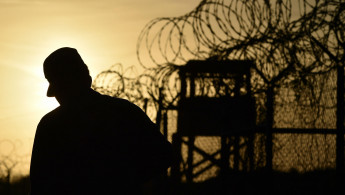The Arab legacy at Guantanamo Bay prison
Arab still represent the overwhelming majority of the inmates at the US prison at Guantanamo Bay - 114 of the 136 people still there are Arabs.
The US last Sunday announced that the resettlement in Uruguay of six men - four Syrians, a Tunisian and a Palestinian - who had been in the prison for more than a decade.
That resettlement means there are no Syrians left in custody. Among those still being held are 79 Yemenis, 14 Saudis, four Libyans and three Tunisians. There are two each from Mauritanian, Morocco and Algeria and one each from Palestine, Egypt, Kuwait, Iraq, Somalia and the UAE.
Obama signed an executive order to shut down the prison almost six years ago because it harmed the reputation of the US all over the world. That order has been thwarted by practical and procedural obstacles.
The Uruguay deal had been originally scheduled for earlier this year, but the process was held up by the recently departed defence secretary Chuck Hagel, according to press reports. One US official told the Reuters news agency that differences of opinion over the pace of the repatriation "increased tensions between Hagel and the circle close to Obama. The tensions ended with Hagel's resignation last month".
A Pentagon source, who refused to be named, told al-Araby al-Jadeed that "Hagel's departure might speed up the transfer of detainees classified as dangerous to US territory for trial based on applicable US laws."
Whether this is correct remains to be seen.
The US is concerned some inmates might go back to fighting on their release, as has happened before, hence the problem with the Yemenis: the US is not confident the men can be returned to Yemen due to the deteriorating conditions in their country, and no third party would accept so many men under the terms and conditions demanded by the US.
| Obama signed an executive order to shut down the prison almost six years ago because it harmed the reputation of the US all over the world. |
Some inmates are big names, chiefly Ramzi Bin al-Shib, the coordinator of the 11 September 2011 attacks, and Khalid Sheikh Mohammad, the so-called mastermind of those attacks. The US does not want to release them.
US authorities have recommended the release of half of those still in custody, and trials for many others. However, that is still not a solution that would close the prison for good - the recommendations, if implemented, would still leave more than 30 in custody.
This is an edited translation of the Arabic original.



